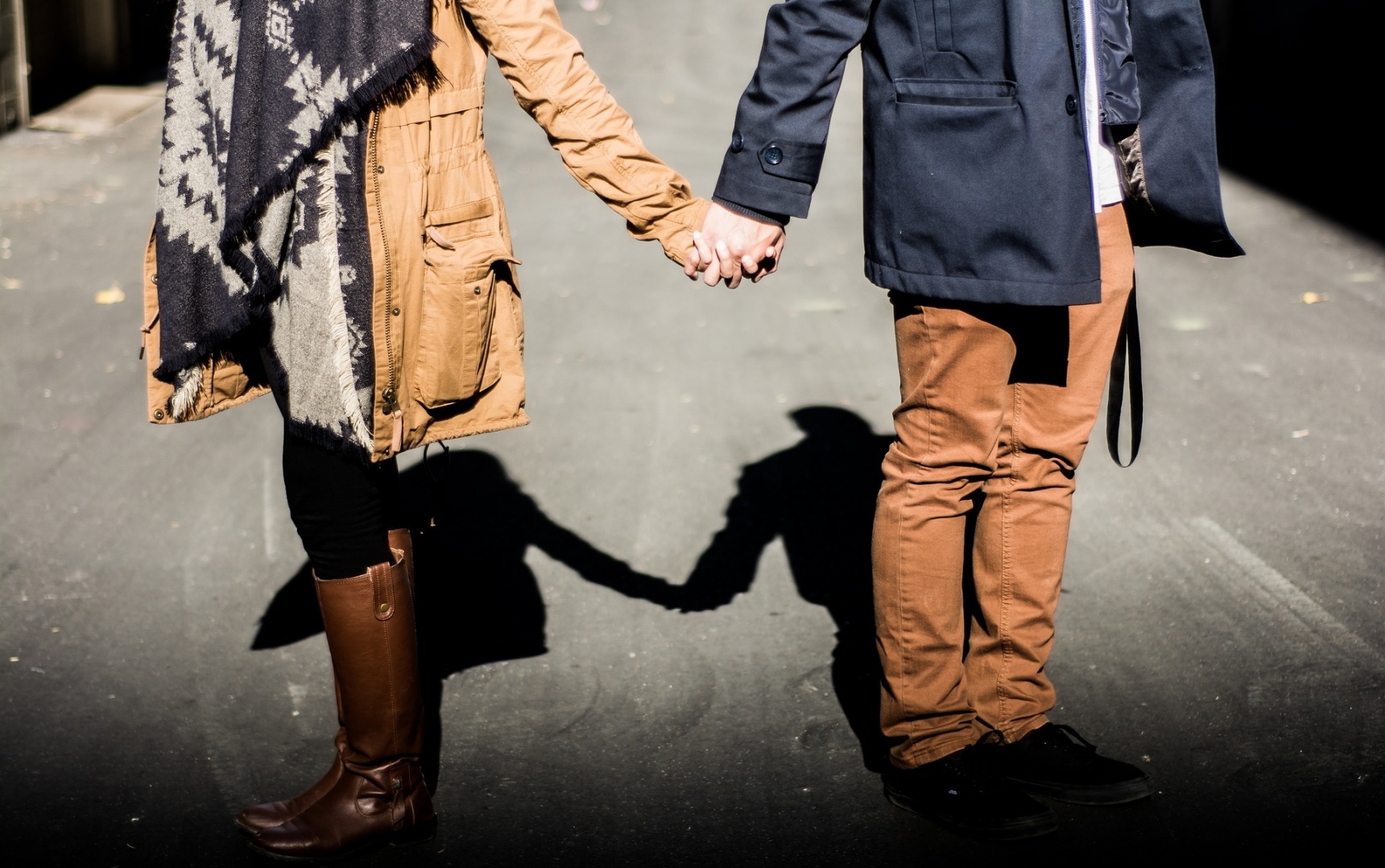Japanese Men + Western Women = Yes? No? Maybe?
The next time you're walking around in Tokyo, try this quick experiment: look for couples comprising a Western man and a Japanese woman, and count them. Done? Now look for the opposite: Japanese men with Western women.
We'll bet a dinner and beer that the first case will far outnumber the second. Why might that be?
'Well, there aren't that many Western women in Japan to begin with...'

https://pixabay.com/en/letters-numbers-toys-magnetic-1671489/
One important factor is sheer numbers. If we look at official statistics for Japanese residents from Western countries (as of the 2016 census), men certainly outnumber women in Japan—by a ratio of almost 2-to-1 if we exclude short-term residents and diplomats (it's 3-to-2 if they're included).
However, let's take a closer look the difference for a moment. For example, let's consider the United Kingdom: In Japan, there are over 11,000 male British long-term residents and nearly 4,000 female residents, most in the 20 to 60 age group. While that's nearly 3-to-1 in favor of men, marriages among residents show an even larger gap.
If we look at the Ministry of Health, Labor and Welfare's figures for 2014 and 2015 (the most recent available), there were 236 cases where a British man married a Japanese woman in 2014, and 235 in 2015. By comparison, there were 50 British brides to Japanese men in 2014 and 44 in 2015. This gives us a ratio of just under 5-to-1 in favor of men.
For Americans, where the gender gap is 2-to-1 for long-term residence, the marriage gap is more than 5-to-1 in favor of men (1,088 to 201 marriages in 2014, and 1,127 to 199 in 2015). If we go even further back to look historically at international marriages from 1965 to 2014, British grooms beat out British brides by a ratio of 12-to-1, while for the U.S., the marriage figure is nearly 14-to-1. So the relatively closer ratios are, in fact, a recent correction.
Both historically and currently, the figures present us with a pretty clear conclusion: there are factors behind the men-to-women foreign relationship gap beyond mere population.
'I'd like to date them! But I don't know where to meet them...'
Let's take a look at some video surveys. Of course, we must start by saying that most Japanese men who answer dating questionnaires or are featured in videos on the subject are not against the idea of dating a Western women a priori. For many, nationality really doesn't make a difference: they would go into such a date with the same excitement (or lack thereof) they would have for a Japanese woman. Just watch how enthusiastic guys are in the following video by Rachel & Jun!
https://www.youtube.com/watch?v=9ZriIkz7Uz0
However, even in a metropolis like Tokyo, not many locals have foreigners in their circle of friends. The number of Western foreigners is still small compared with other countries (of Japan's 2.3 million long-term foreign residents, 1.9 million are from Asia), and given the realities of visa rules, the job market and typical language ability, they tend to be employed only in specific industries and positions—which means most Japanese people won't necessarily meet a Western foreigner at work (and if you're a teacher in particular, office relationships are essentially forbidden).
When it comes to universities, while Westerners make up a bigger part of the population there, they tend to be concentrated in English-taught programs, in which less Japanese students enroll. On top of which, as this 2010 study on relational mobility in Japan examines, Japanese people in general are far less inclined than people from other cultures to disclose personal information to new people, making it hard to take that first step in initiating a relationship—which can be a problem if you're from a culture where women aren't used to making the first move. This, coupled with what we mentioned above in terms of numbers, make it less probable for Japanese men to meet Western women on the whole.
More importantly, while occasional meetings might happen at social occasions or at social locations like pubs or clubs, Japanese men seem to also be blocked by their (sometimes accurate, sometimes not) perception of their own lack of English skills—leading many to eliminate themselves even before finding out if the other party speaks Japanese or not!
This, coupled with Western women possibly being perceived as strong and assertive compared to the traditional (if gradually shifting) Japanese expectation of a docile homemaker, might lead many shyer men to just give up, as lamented by blogger Reannon Muth. Regardless, fear of talking to Western women—for whatever reason—is suggested as a major factor in this Madame Riri article (in Japanese) that summarizes opinions from a number of Western bloggers, including our own Zooming Japan.
'…and even if I did meet them, they wouldn't like me!'
A lot of Japanese men are also brought up with the idea that Western women will have no interest in them. In their minds, Western men are stronger, taller, more masculine… you get where we're going.
This is reinforced by media stereotypes: in Western movies, Asian men in general are rarely seen in the role of Casanovas and heroes, with most of the roles falling in the category of "average-looking computer genius"—as expressed by Wang Jia in his TEDx Talk below:
https://www.youtube.com/watch?v=sWnAtLt8kSs
This lack of interest has some basis in reality, as shown by data from Ok Cupid on racial attraction, with Asian men getting below-average rankings from women across the board.
However, many women who come to live in Asian countries find Asian men as attractive as any other man on the planet, and some might even prefer Asian features over Western ones, as author Caroline Pover discusses in her book, Love With a Western Woman: A Guide for Japanese Men. So while this stereotype may be informing—and limiting—the actions of Japanese men, it's high time for them to let it go!
https://www.youtube.com/watch?v=gQYoJotXN7U
Another source of concern is the children's education. Once again, the choice of which country to school the children in might create problems for the couple, especially given the large differences among school systems and the cost of foreign private schools in Japan. As mentioned by the Japan Times, there is a lot of discussion among international couples about what is best for the children's education.
Finally, some men think cultural differences in terms of language, religion, etc., might simply be hard to deal with. And don't forget all the necessary yet cumbersome visa procedures, as some interviewees in Nobita's video below remind us.
https://www.youtube.com/watch?v=nGeGYp2ASag
Of course, these latter concerns are borne equally by Japanese men and women alike. So while they don't explain any difference in coupling ratios in and of themselves, they may serve to further suppress an already unlikely scenario, pushing down its social acceptability. The cultural battle over Japanese women marrying Western men has been broadly fought for decades, but men still have that battle ahead of them. A lack of commonality can, in itself, form a barrier. Nobody wants to be the first (or one of the few) to stick their neck out.
When thinking about these things, Japanese men seem to prefer going the safe route and opting for marriage with someone from their own nation.
…but this trend might also change!

https://pixabay.com/en/stock-chart-line-chart-line-chart-149421/
On the other hand, given the present age of globalization and mobility, it's not rare for people who have the chance to live abroad to fall in love with a certain country and, by extension, with its people. Similarly, a fascination with a certain language and culture might lead people to actively seek companionship with a person of that nationality.
For example, it's been found that studying abroad changes one's perspectives on one's relation with foreign countries—and this study shows a correlation between studying abroad and future prospects of working abroad in the case of European students. That says nothing directly about relationships per se, but it does weaken the barrier to spending one's life abroad with a special someone.
With this in mind, while it may take time for ideas to change within Japan, it seems probable that as more and more Japanese nationals spend time outside their home country, the number of international relationships and marriages may also increase. And following a dip that bottomed out in 2011, recent statistics show a rising trend in Japanese students heading overseas, with the top four destinations being the U.S., Canada, Australia and the U.K.
Is it only a matter of time before the sight of a Japanese guy with a Western girl becomes a common one on the streets of Tokyo? Vloggers like Rachel & Jun and Texan in Tokyo are certainly pushing perceptions in that direction!




